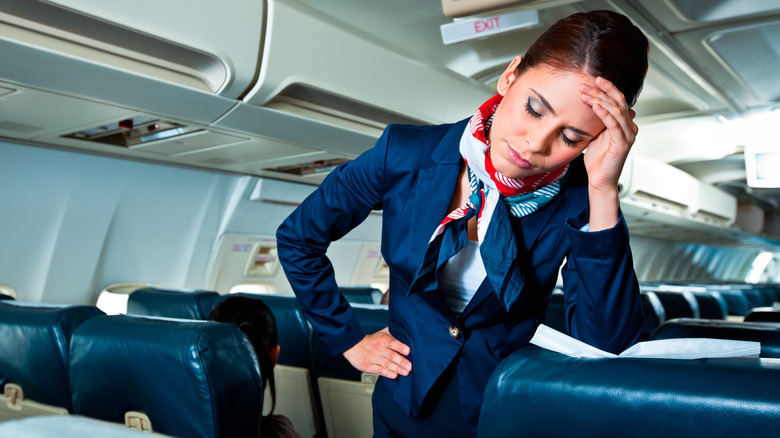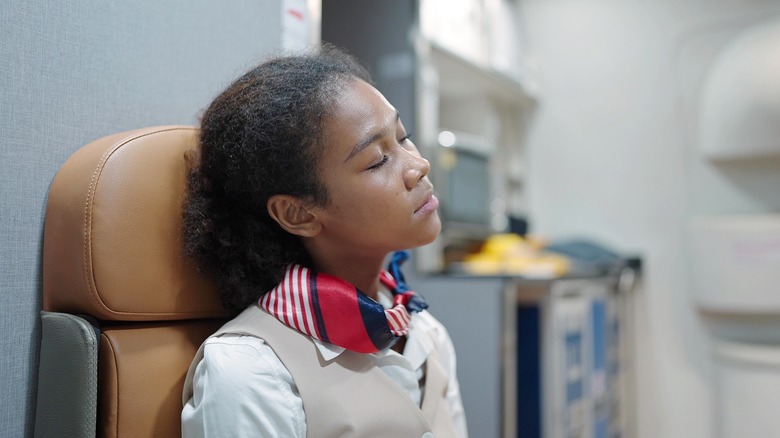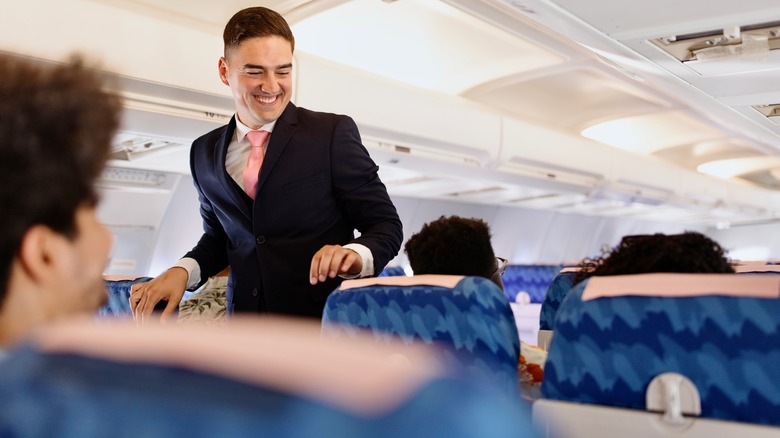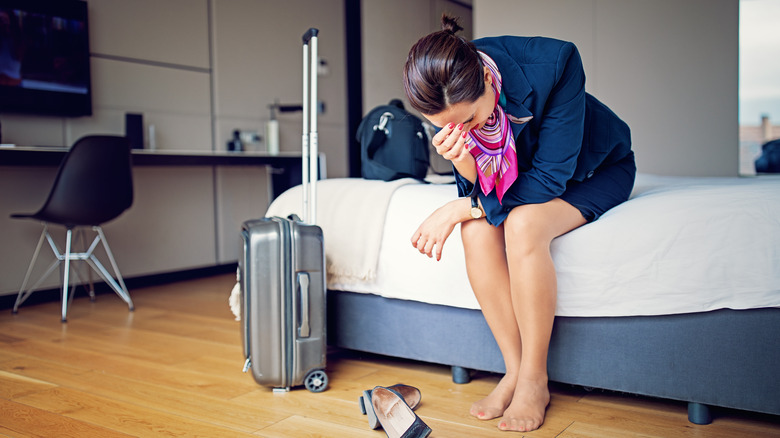Scary Health Risks No One Tells You About Before Becoming A Flight Attendant
"This job is really testing my immune system," wrote a frustrated flight attendant in a Reddit post. "Being [in] a confined tube with a shocking number of people who just cough away, a lot of the time without even covering their mouths, you will get sick so often." Other flight attendants agreed, adding, "I was sick every two weeks for the first 6 months out of training." And, "I get sick like once a month."
Almost anyone who's traveled by commercial flight knows that flying can make you sick — there are germy spots you should never touch on an airplane and certain times of day when the cabins are likely to be extra dirty. Once you board a flight, there's no way to guarantee you won't get sick — and cabin crew know this all too well.
It's not just a small group of airline workers on Reddit that are affected by illness. A 2003 study published in Occupational and Environmental Medicine concluded that flight attendants suffered more colds, bouts of the flu, and chest illnesses than the average working person. Besides catching common viruses, flight attendants are also at risk of experiencing some serious health issues that could put their lives in jeopardy.
Flight attendants are more prone to some cardiovascular conditions
In 2022, a flight attendant died during a flight from Bahrain to Paris after suffering from a heart attack. In 2023, a 24-year-old flight attendant died just after their plane had landed in Essex, England, due to sudden adult death syndrome triggered by cardiac arrest.
While it's hard to conclude that these tragic deaths were directly linked to the flight attendants' work, research shows that cabin crew members are more likely to be impacted by some cardiovascular conditions compared to the average person. A 2014 study published in the journal Environmental Health noted that female flight attendants were 3.5 times more at risk of cardiac disease compared to the average American woman. The study also added that male flight attendants are just as likely to suffer from cardiac conditions as the general population, even though they're more likely to maintain a healthy weight and avoid smoking.
According to the Centers for Disease Control and Prevention (CDC), flight attendants are also more at risk of developing peripheral artery disease the longer they fly for a living. Peripheral artery disease is a condition where the arteries narrow, limiting blood flow to the limbs. In serious cases, the disease can lead to amputation, stroke, and heart attack.
Inconsistent sleep is a common (and dangerous) part of the job
Though some tips and tricks can make jet lag easier to deal with, the phenomenon can still take a toll. Feeling fatigued and sleep-deprived is bad enough when you're traveling for fun, but when your job requires you to hop time zones and be alert at odd hours, it can be even harder to cope.
For flight attendants, missing sleep and managing jet lag is more than just feeling sleepy. According to the CDC, regular circadian rhythm disruption can trigger a host of other issues, from hormone imbalances to physical injuries. It also interferes with reproductive health: Research shows that pregnant flight attendants who worked at least 15 normal sleep hours during their first trimester were more likely to miscarry.
Even flight attendants who are confident they can handle an odd sleeping schedule may wind up paying the price later. According to a 2019 study published in Diabetes Care, not keeping a consistent sleep schedule can lead to obesity, diabetes, and high blood pressure. Moreover, a 2018 study published in Cancer, Epidemiology, Biomarkers & Prevention found a link between night shift work (or, in this case, red-eye flights) and multiple types of cancers.
Radiation and sun exposure may cause cancer
Inconsistent sleep isn't the only thing that may cause cancer among flight attendants. Cabin crew should also watch out for radiation while working the friendly skies. "Some frequent fliers would be surprised to learn that their exposure to radiation exceeds that of nuclear power workers," Scott Cohen, a researcher at the University of Surrey, shared with Vox. Cosmic ionizing radiation is a type of radiation produced in outer space that leaks into planes when they reach high altitudes, and some experts believe it can cause cancer. While there are guidelines in place to limit flight attendants' exposure to harmful radiation, some crew members who routinely work on long flights exceed recommended exposure levels, according to the CDC.
Sun exposure during flights may also raise the risk of developing cancer. A 2015 study published in JAMA Dermatology discovered that pilots and flight attendants were about twice as likely to be diagnosed with melanoma, the most dangerous form of skin cancer, as the average person. The researchers theorized that stronger UV rays in the sky were to blame for the higher incidence of skin cancer among airline workers.
Flight attendants are more likely to struggle with mental health issues
It's hard to talk about low flight attendant morale without talking about mental health. The COVID-19 pandemic spotlighted issues that can cause burnout and disillusionment among even the most devoted airline staff, including rebellious passengers and unpaid working hours. As a result, flight attendants held rallies in 2024 demanding better working conditions.
With or without significant changes, the work of a flight attendant is linked to poor mental health outcomes. A 2020 research article published in Frontiers in Psychology explained that cabin crew work and overnight hours have long been associated with depression, stress, anxiety, and other psychological issues. With COVID-19, mental health only worsened, with 23% of flight attendants reporting symptoms of depression and 14% reporting symptoms of anxiety during the first year of the pandemic.
Mental health issues can coexist with other health issues, such as substance misuse. A National Institute for Occupational Health and Safety study revealed that flight attendants are much more likely to die from alcoholism than the general population (via American Addiction Centers). It's important to remember that while working as a cabin attendant can come with perks and highlights, stress is often part of the job description, too.
If you or someone you know needs help with mental health, please contact the Crisis Text Line by texting HOME to 741741, call the National Alliance on Mental Illness helpline at 1-800-950-NAMI (6264), or visit the National Institute of Mental Health website.




